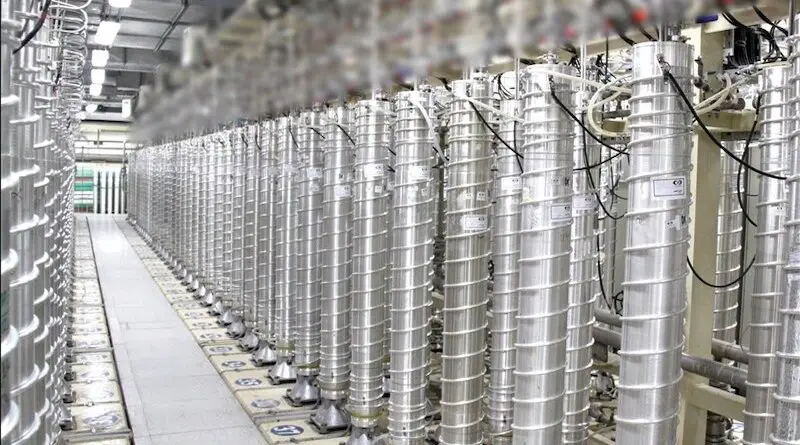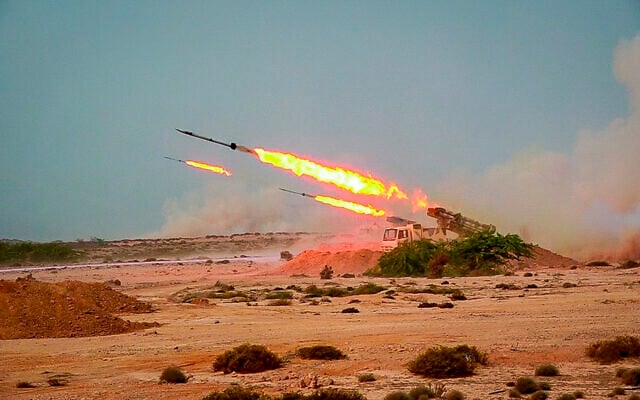This is only the first round between Israel and Iran
All three of Israel's military objectives were met, but the next confrontation is already looming. Iran's leadership hasn't shifted course, and the world will need to monitor or face the consequences. Now is the time for a diplomatic move, bolstered by precise intelligence and new regional alliances.
Israeli Iron Dome air defense system fires to intercept missiles over Tel Aviv, Israel, Friday, June 13, 2025
In those final hours, Israel paid a heavy price, with four people killed in Beersheba after striking dozens of additional Iranian targets, particularly arms production infrastructure aimed at delaying future military buildup. Some lamented that Israel had not used the momentum to deliver a harsher blow to regime targets, with the aim of undermining its stability or even toppling it.
But that seemed more like wishful thinking than an actual strategy. In any case, regime change in Tehran was never among Israel's stated objectives, and it appears an understanding was reached with the US to avoid pursuing it.
Israel had three primary goals in this campaign. The first: to strike Iran's nuclear program and significantly delay its progress. All indications are that enrichment facilities in Natanz and Fordow, the conversion facility in Isfahan, and the reactor in Arak suffered major damage. However, it remains unclear whether they were rendered completely inoperable.
Nuclear power
A critical unresolved question is whether Iran's stockpile of 60% enriched uranium was entirely destroyed. If not, and if Iran manages to secretly enrich it to weapons-grade using its centrifuges and detonate a nuclear device, it could assert itself as a nuclear power.

Centrifuges in Iran's Fordow Nuclear Facility.
This poses a major challenge for intelligence agencies: to detect and identify signs of illicit nuclear activity and enable swift intervention. Should such a scenario arise, Israel will again require tight coordination with the US, which yesterday emphasized its expectation that both sides fully uphold the ceasefire agreement.
Israel's interest is to secure a binding nuclear deal that would prevent Iran from reviving its program and place it under a strict inspection regime, backed by powerful sanctions.
Iran's Missile Program
The second objective was to severely damage Iran's missile program. Around 100 launchers were destroyed during the operation (and use of a similar number was blocked), along with attacks on factories and production infrastructure. Similar, though more limited, strikes were carried out in October of last year, but Iran was able to rebuild its manufacturing capacity faster than expected.
Here too, rigorous intelligence monitoring will be necessary. But it is doubtful whether Israel can maintain continuous enforcement without effectively resuming hostilities. Despite the freedom of action Israel achieved in Iranian airspace, which Iran will now try to counter by rebuilding its air defense systems, it may struggle to replicate the Lebanese model of deterrence.
The third objective was to thwart Iran's plan to eliminate the State of Israel, continuing its attacks on regional proxies, chiefly Hezbollah and the terrorist organization Hamas. The assassination of senior Islamic Revolutionary Guard Corps officials and strikes on IRGC assets will certainly delay Iranian plans, but not foil them altogether.
Endgame: Nuclear status
Iran will not abandon its goal. It may adopt new tactics and deepen efforts at concealment and deception, but its ultimate aim remains unchanged, even if temporarily delayed.
From this perspective, the campaign that concluded today is not the end of the story, but merely the end of the first chapter in the Israel-Iran conflict. The next chapters have yet to be written, and their content will depend on Israel's resolve to enforce its achievements through both force and agreements, and on the willingness of the US and the Western world to cooperate in preventing Iran's resurgence.
If that cooperation fails to materialize, the countdown to the next round has already begun - one for which the Iranians will be better prepared and thirsting for revenge. For a stark precedent, one need look no further than Operation Guardian of the Walls in May 2021, which ended with Israel declaring victory and deterrence, only to be shattered by Hamas' October 7 terrorist onslaught.


No comments:
Post a Comment